On this date in 1980, the United States Olympic Hockey Team, led by legendary coach Herb Brooks and captained by Mike Eruzione, shocked the world with their stunning 4-3 victory over the Soviet Union.
Eruzione was born in Winthrop, Massachusetts in 1954 and graduated from Winthrop Senior High School in 1972, where he was captain of the hockey team his senior year. Following high school, Eruzione attended Berwick Academy for a year before joining the hockey program at Boston University.
While at BU, Eruzione was a model of consistency and would average 23 goals a season, never scoring less than 21, making the Frozen Four each of his four seasons there. His senior season was his best, with 23 goals and 41 assists for 64 points which allowed him to become BU's all time leading scorer with 208 points.
Importantly, he would also gain valuable international experience by playing for Team USA at both the 1975 and 1976 World Championships.
Little known are the details of Eruzione's hockey career in between Boston University and the 1980 Olympics, as Eruzione would follow his college career with two full seasons with the Toledo Goaldiggers of the International Hockey League.
Eruzione would score 30 goals and 56 assists for 86 points, finishing second in team scoring. He would also contribute 21 points in 17 playoff games as Toledo would capture the prestigious Turner Cup by defeating the Port Huron Flags in seven games in the finals. Eruzione was named the IHL Rookie of the Year following the season.
Eruzione won the Turner Cup as a Toledo Goaldigger
His second season in Toledo saw Eruzione score another 27 goals and 72 points. He also has six games with the Philadelphia Firebirds on his record with no points scored.
Eruzione became part of the 1980 United States Olympic Team the next season and was named the team captain. In preparation for the Olympics, the team made up of college amateurs with an average age of 22, would play a four month schedule of games against college, minor, pro and national teams, the kind of familiarity and unity modern Olympic teams comprised of professionals thrown together on short notice can only dream about.
Brooks, the final cut from the gold medal winning 1960 USA Olympic Hockey Team, put into place a plan to emphasize speed, conditioning and discipline when taking on the much older and vastly more experienced Soviet team, who, while technically considered amateurs by the letter of the law, were anything but.
Brooks also needed a way to unite his club that had the potential for division due to the large numbers of players from either Minnesota or Massachusetts splitting the squad into divisive factions. He chose to do that by challenging his team physically, as he raised their conditioning level, and mentally, as he drove them with his words. The effect brought the team together against a common foe - Brooks.
Just prior to the Olympics, Brooks scheduled a game against the Soviets on purpose, which the Americans famously lost 10-3. Now that they had faced the Soviets once, they could get the awe out of their system should they meet again in Lake Placid.
The games in Lake Placid for the United States began with a come from behind 2-2 tie against Sweden. While not a win, the dramatic goal against favored Sweden with goalie Jim Craig pulled for an extra attacker with just 27 seconds remaining felt just like a win.
A tough looking matchup on paper against Czechoslovakia, a team with future NHLers Jiri Bubla, Miroslav Dvorak, Miroslav Frycer, Milan Novy, Jaroslav Pouzar and Anton, Marian and Peter Stastny, ended with a confidence building 7-3 win for the Americans whose first goal was scored by Eruzione.
The schedule now turned in the United States favor, with easy wins over Norway, again with Eruzione scoring the first American goal, and Romania before a 4-2 win over West Germany to finish group play tied with Sweden at 4-0-1 and a place in the four team medal round and a date with destiny on this date in 1980 with the Soviet Union.
Following the first five game group stage of the tournament, Eruzione was sixth on team scoring (and 25th in the group) with two goals and two assists, behind Rob McClanahan, Buzz Schneider and Mark Johnson with seven points and Mark Pavelich and Dave Christian with five.
With their previous tie against Sweden carrying over into the Medal Round standings, as well as the Soviet's 4-2 win over Finland, the Americans began Medal Round play already down a point to the Soviets in the standings.
The game, which was played in the afternoon but not broadcast on ABC until later that evening, forcing us to listen to the game live on the radio, began with the Soviet's Valdimir Krutov, a future Vancouver Canuck, scoring at 9:12 of the first period. Schneider tied the game at 1-1 on a goal from Pavelich only to have the Soviets move back ahead with a goal at 17:34 from future Calgary Flame Sergei Makarov.
With the second ticking down in the first period, Christian dumped the puck in from beyond the center red line with five seconds remaining in the peroid. Soviet Goaltender Vladislav Tretiak put his pads together and allowed the puck to rebound far in front of him, right to a hustling Johnson who flew in between a pair of defenders, scooped up the puck, put a deke on the flat-footed Tretiak to go around him to Johnson's left and put the puck into the wide open Soviet net with one second remaining in the period. We recall it taking an eternity while listening to the game live on the radio for the goal to be allowed, as there was some question at the time if the goal had come before time expired in the period.
Johnson evens the score with one second left in the first period
In his anger over the late goal, Soviet coach Viktor Tikhonov pulled Tretiak and replaced him with backup Vladimir Myshkin, to the surprise of everyone involved when the Soviets returned to the ice to take the faceoff to complete the first period, having retreated to the locker room in order to pressure the officials into deciding the period had indeed ended.
Despite the high of ending the first period tied at 2-2, the Soviets once more took the lead, their third of the game, with a goal by Alexandre Maltsev just 2:18 into the second period on a power play. With way more than half the game left to be played and three Soviet goals on the scoreboard already, no one could imagine that would be the Soviets final goal of the game.
Craig kept the Soviets off the board for the remainder of the period, despite the outshooting the Americans 12-2, so the third period opened with the Soviets up 3-2 and holding a 30-10 advantage in shots on goal.
Johnson evened the score on the power play just before the halfway point of the third with his second goal of the game at 8:39 when Dave Silk shot towards the net, which was blocked by a defender. Johnson however, pulled the loose puck away from the defender's stick and fired the puck past Myshkin to tie the game at 3-3 and send the fans into a state of delirium.
Just 1:21 later, Eruzione's legacy as a hockey player would be sealed. Schneider would dump the puck into the Soviet zone where it would be deflected by Myshkin to his right. The puck would then be weakly moved toward a teammate by a Soviet defender under pressure from an American forechecker. Before it could reach the other Soviet, the puck was intercepted by Pavelich who somehow got the puck back into the center of the zone just above the faceoff circles, despite facing and moving the opposite direction while falling down, where it was corralled by Eruzione (which is Italian for "eruption"), who squared himself to the net and, using Vasily Pervukhin as a screen, fired the puck past Myshkin from 25 feet out, sending the arena into pure bedlam and himself into the record books with the most famous goal ever scored in hockey history.
The remainder of the game was an agonizing ten minutes that seemed to last 60, as Craig made save after save against the Soviet attack. The Americans kept to Brooks game plan, with short shifts using all four lines, putting their conditioning to the use Brooks envisioned months earlier against the veteran Soviets.
Jim Craig holding off the Big Red Machine
Finally, the crowd changed their chants from "USA! USA!" to "TEN! NINE! EIGHT! SEVEN! SIX! FIVE! FOUR! THREE!" at which point broadcaster Al Michaels delivered his famous line: "Do you believe in miracles? YES!" as the game ended and the players burst into cheers and hugs, while Brooks vanished up the corridor and out of view.
In cold, hard numbers, the win gave the USA three points in the standings to the Soviet Union's and Sweden's 2 points and Finland's 1, following the Swedes and Finns 3-3 tie the same day, setting up the United States final game against Finland. Assuming the Soviets would beat Sweden, which they did 9-2, a US win over Finland was still required for the Americans to win gold outright.
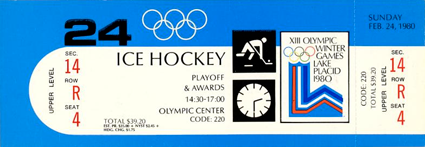
Finland led the final game of the tournament 2-1 after two periods, but after a furious Brooks warned the team during the final intermission that "If you lose this game, you will take it to your f***ing grave!" He then walked almost all the way out of the room before turning around and repating "To your f***king grave."
Properly motivated, the team came out and scored goals by Phil Verchota, McClanahan and Johnson to win the game 4-2 to capture the gold medal and set off a new round of celebrations having successfully completed not just a seven game tournament, but a journey that began months earlier, as Brooks transformed them from college kids into Olympic champions.
It was the last game Eruzione would ever play.
Even though he was offered a contract by the New York Rangers, Eruzione declined to continue his career, stating that he'd reached the pinnacle of achievement already.
Despite the game against Finland being his last, Eruizone had one more memorable moment up his sleeve. During the medal ceremony, where only the captain of each team was to mount the podium, Eruzione famously called for his teammates to join him on the top step of the platform which was only just barely large enough to accommodate them all.
Today's featured jersey is a 1980 United States National Team Mike Eruzione jersey, the actual jersey worn during "The Miracle on Ice" when Mike Eruzione scored "The Goal Heard 'Round the World" in a 4-3 victory over the Soviet Union at the 1980 Olympics.
Eruzione with his 1980 jerseys and the stick used to score his famous goal
The white jersey Eruzione wore during the Miracle on Ice game sold in 2013 for $657,250 when put up for auction along with his blue jersey from the final game against Finland, his stick, gloves, pants and warmup suit from the gold medal ceremony.
Today, Eruzione makes appearances as a motivational speaker and is said to have never met a hand he wouldn't shake or a microphone he didn't like.
Bonus jersey: Today's bonus jersey is a 1980 United States National Team Jim Craig jersey. This jersey is a true icon of hockey, notable for it's contrasting blue nameplates with white lettering.
While many manufacturers have produced replicas of the jerseys worn in Lake Placid by the United States "Miracle on Ice" squad, the original jersey manufacturers were Norcon of Forest Lake, Minnesota.
The team would reunite 22 years later to light the torch to open the next Olympic Games in Salt Lake City in 2002. It's a bit long, so please skip ahead to 4:30 for the conclusion.
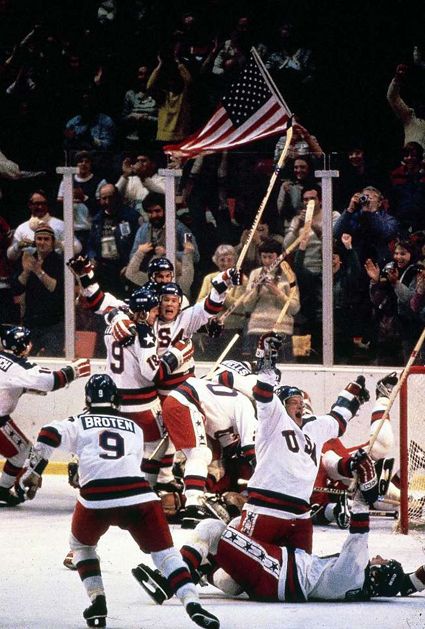
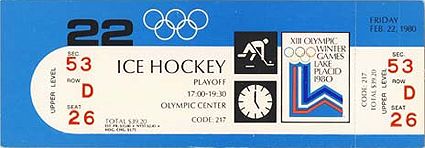
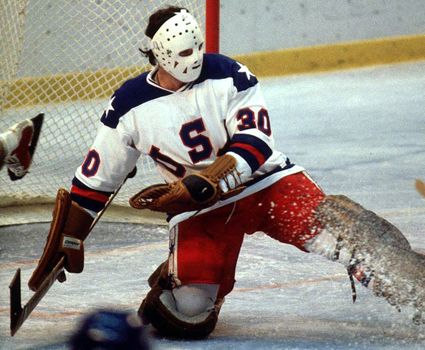


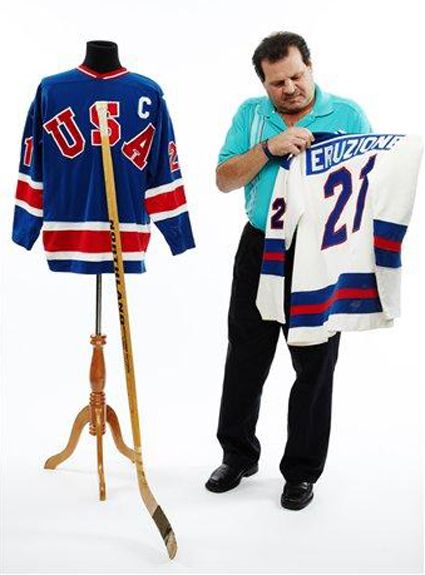

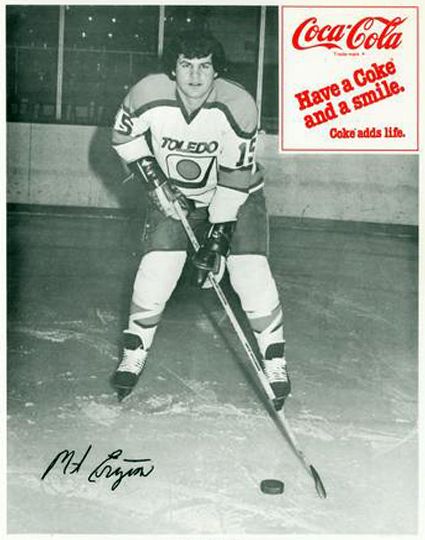
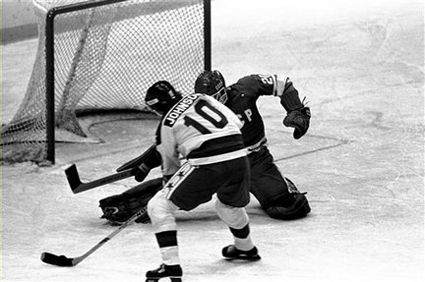
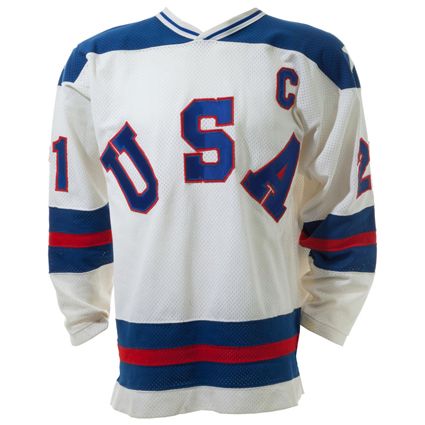
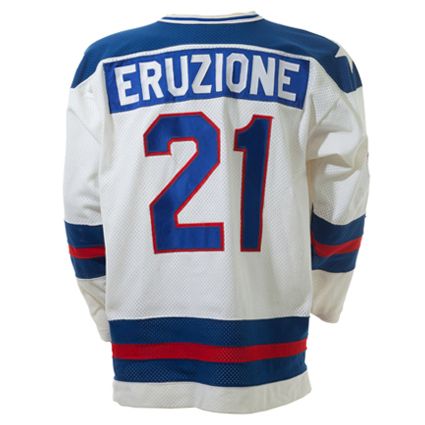
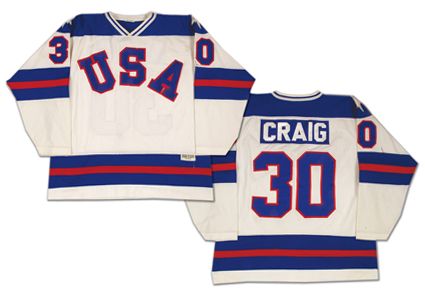










No comments:
Post a Comment
We welcome and encourage genuine comments and corrections from our readers. Please no spam. It will not be approved and never seen.